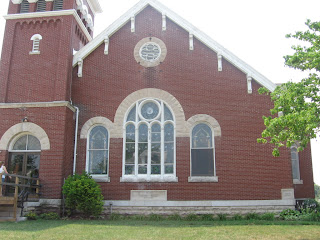 |
| We the people |
Let me speak to the one that I have some knowledge of, the Ohio Livestock Care Standards Board.
The voters of Ohio established the board to consider issues surrounding farm animal care in the state of Ohio. The bipartisan board is to look at these issues through multiple lenses. Economics, bio security, animal welfare, and science to name a few. They have made several decisions on issues over the last year and are moving forward methodically toward others. The announced rally by HSUS promises to be the first test of the board's resolve in the face of opposition. Will the board hold firm to it's announced intent to allow the close confinement of veal calves for a period of time or will it reverse direction in the face of opposition?
As a farmer, I really enjoy the quiet of my rural life where the main rule of peaceful existence is "Mind your own business, and your neighbor probably isn't as big an idiot as it appears as you drive by". I, along with the millions of others that supported the establishment of the board, don't want to have to deal with protesting and rallying. We want to live quiet and peaceful lives at home, with our wives, our children, our land, and our animals. I really don't want the board to start making decisions based on who posts the most comments to a proposed rule, or who can rally the most vocal crowd at a meeting. The board is supposed to me making decisions based on the best available science, experienced reason, and thoughtful comment.
But vocal opposition to governance seems to be the way of the world right now. Is that right? Is that good?
I fully expect the agricultural community to quietly conform to the decisions of the Care Board even if those decisions do great harm and ultimately force decisions that otherwise would not be considered. Will the vocal opposition ultimately conform to the decision of the board? To do so would indicate their acceptance of the idea that the board is looking out for the best interest of the people of Ohio and the care of the animals within it's borders.
 |
| In God we trust |
There appears to be a basic inequality of consequence between the agricultural community and the vocal oppositition to Care Board decisions. What do I mean by an, "inequality of consequence"? It is the idea that to one community of people a board decision has greatly disproportionate effects than the same decision has for another community.
The agricultural community knows that a bad Board decision can be disastrous to the agricultural community on all levels. Emotionally, socially, financially, and even spiritually a decision hits the agricultural community very deeply. For some there will be no opportunity to "fight again another day". For some a bad Board decision will force them to decide where to live and what to raise. Some will move to new communities, disrupting marriages, families, schools, Churches and all the things that go with being relocated. They and their talents will have been forced out of the agricultural community of their choice, never to return.
 |
| The pursuit of happiness |
From my view point, a board decision that is upsetting to the vocal opposition is, well, upsetting. They may be mad, frustrated, and disgusted but at the end of the day they can go home to life pretty much as it always has been. A single decision does not change the social fabric of the community they live in. They will not be forced to decide if they want to continue to live and raise their children in the state. It will not put them at financial peril. Their lifestyle will not have been threatened. It may actually strengthen their resolve and pull their community together. In any event they will be able to "fight again another day". Their talents will not have been lost to their community.
 |
| We must earn their trust |
I have left several questions unanswered in this short discussion. I hope they propel your thoughts forward.
Thanks you for your attention.
No comments:
Post a Comment